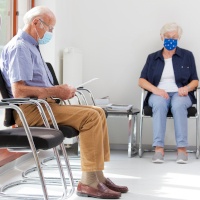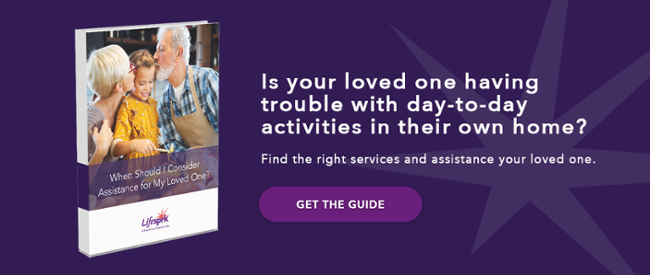
The importance of addressing health care needs now
Concerns about COVID-19 prompted us to delay my 89-year-old mother’s cataract surgery until she couldn’t tell the difference between her cat and a couch pillow. Finally, convinced that the infection-control measures implemented by her ophthalmology clinic were rigorous enough, we went ahead with the procedure. In hindsight, I wish we hadn’t waited so long, but fear can be extremely persuasive. And paralyzing.
The reality of age-related infection risk
We’re still learning the nuances of the novel coronavirus, but one thing we know for certain is that the risk of becoming severely ill and dying from COVID-19 increases with age. In fact, the Centers for Disease Control and Prevention (CDC) reports that adults age 65 and older account for 8 out of 10 COVID-19 deaths in the United States. Considering these horrific statistics, it’s understandable that some seniors (perhaps influenced by their adult children) have avoided going to the clinic, hospital, or emergency room.
According to a poll by the American College of Emergency Physicians, 80 percent of adults said they were concerned about contracting COVID-19 from another patient or visitor, and 29 percent have actively delayed or avoided seeking medical care for the same reason.
Yet the consequences of delaying care can be devastating, especially for people with serious illnesses or chronic medical conditions. A study published in the Journal of the American Medical Association (JAMA) found that in the states with the most COVID-19 fatalities, deaths not related to COVID-19 jumped in March and April, compared with January and February. Among their finding: deaths tied to diabetes increased by 96 percent, heart disease by 89 percent, Alzheimer’s disease by 64 percent, and stroke by 35 percent.
Download our guide: When Should I Consider Assistance for My Loved One?
Overcoming fear to stay well
When COVID-19 cases flooded assisted living facilities and hospitals, people became wary of health care providers and institutions. “For several months, some of our clients wouldn’t allow us into their homes,” said Tanya Castillo, RN, BHS, Lifesprk Director of Community Home Care. “But even during a pandemic, people need medical care.” In one case, the home health aide was told to set up medications in the garage; in another, the aide was handed the medications and pill box through a partially open door and asked to set them up in the hallway. Not ideal, given the less-than-sanitary conditions of these environments.
“We’ve gradually earned our clients’ trust by educating them on what we’re doing to protect them and our staff,” Tanya said. Those measures have included personal protective equipment (PPE), employee health screenings, and CDC-guided competency training on how to don and doff gloves, masks, and gowns.
Hospital-level care at home
But what about older adults with a serious illness or chronic condition—people who need immediate and ongoing medical care? That’s where home-based hospital-level care can play a critical role. In May, Lifesprk and North Memorial Health launched Hospital@Home, a new program for adults age 65 and older who are acutely ill and require hospital-level support, but who can be safely monitored and treated at home.
“Once a client is evaluated and stabilized in emergency department, and the ER physician has determined that they are a good candidate for the Hospital@Home program, they can be discharged home, often that same day,” said Dr. Nick Schneeman, Lifesprk Chief Medical Officer. “If at any point, the client needs additional levels of care, they can always return to the hospital.”
Hospital@Home includes a geriatrician-led care team, daily care and coordination by a primary nurse, infection control assessment, quarantine education and guidance, daily lab testing and monitoring, and access to a full range of in-home and wellness services. To limit the potential spread of COVID-19, most follow-up visits are conducted virtually using Lifesprk’s Telepak in-home monitoring kit, Bluetooth technology, and video-call capabilities (no WIFI connectivity required). If the client needs wound care, speech therapy, occupational therapy or physical therapy, Lifesprk can bring those services into the home.
“So far, Hospital@Home has successfully treated clients with acute renal failure, congestive heart failure (CHF), chronic obstructive pulmonary disease (COPD), pelvic fractures, and other serious health conditions,” said Dr. Schneeman. “One of the program’s most important benefits—besides reducing the risk of infection—is keeping clients and families together, which just isn’t possible in a hospital setting.”
To learn about Hospital@Home from a client’s perspective, check out our recent blog.
Averting health crises
One way to minimize the need for emergency care is to address health concerns before they become problems. We don’t want you to avoid care to avoid COVID-19 – in order to maintain long-term health, there will be times where seeing your provider whether virtually or in-person is necessary. Keeping your health in check will also help you stay healthy – guidance and advocacy are a big part of prevention.
Lifesprk offers a full range of whole-person senior services—home health, skilled nursing, primary care, life management, transportation, community resource connections, and hospice care. Download our free guide on ‘When to Consider Assistance’ to learn more.
You can also schedule a free consultation to learn how Lifesprk can help you and loved one enjoy a happier, healthier, more independent life—even during a pandemic.



